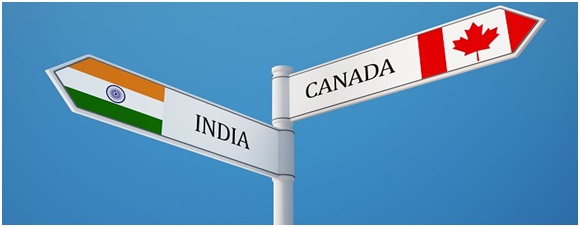Canada Needs to See India – Not Just the Diaspora (Indian Express)

- 22 Sep 2023
Why is it in News?
The Canadian Prime Minister's statement in Parliament, accusing Indian agents of the death of Hardeep Singh Nijjar, has significantly strained India-Canada relations. Rebuilding trust will necessitate a thorough and open political dialogue on the role and politicization of Canada's Indian diaspora and its impact on bilateral relations.
Recent Developments Leading to the Current Standoff:
- Death of Khalistan Tiger Force (KTF) Chief:
- Hardeep Singh Nijjar, wanted by the Indian government, was killed in a shooting in Surrey in June.
- The National Investigation Agency (NIA) had announced a Rs 10 lakh reward for Nijjar in 2022, accusing him of conspiring to kill a Hindu priest in Jalandhar, Punjab.
- G20 Summit Discussions:
- During the G20 Summit in Delhi, the Canadian PM and the Indian PM discussed Khalistani extremism.
- The Canadian PM raised concerns about foreign interference in Nijjar's murder and sought India's cooperation in the investigation.
- The Indian PM expressed deep concerns about ongoing anti-India activities by extremist elements in Canada.
- Canadian Parliament Statement and Diplomatic Expulsions:
- Canada's PM accused "agents of the Indian government" in Nijjar's killing.
- Canada expelled the top Indian diplomat, the head of RAW, from the country.
- In response, the Indian government summoned the High Commissioner of Canada and expelled a senior Canadian diplomat from India.
The Evolution of India-Canada Relations:
- During the Cold War:
- During the Cold War, India and Canada enjoyed a positive relationship, driven by their shared Commonwealth status and common views on the importance of the United Nations, multilateralism, and global development.
- However, differences arose during Cold War conflicts like Korea, Hungary, and Vietnam, straining relations. India's pursuit of a nuclear program also added complexity.
- Post-Cold War (1980s):
- Increasing immigration from India began to improve relations, but limited opportunities for trade and security cooperation hindered substantial diplomatic engagement.
- Post-1998:
- Significant efforts were made to reinvigorate the relationship after 1998 when Canada rejected India's nuclear status.
- Current Status:
- Today, the focal point of the relationship is investment and trade.
- However, it's important to note that certain segments of the diaspora community harbor strong negative sentiments towards India, reject its territorial integrity, and aim to fragment it.
Canada's Role in Straining India-Canada Relations:
- Failure to Address Anti-India Activities:
- Canada's reluctance to take action against anti-India activities on its soil has contributed to the deterioration of relations.
- The Canadian PM's emphasis on the rule of law overlooks the impact of individuals like Nijjar and his separatist associates, who have engaged in activities affecting both Canada and India.
- Instances of violence against Indian diplomats were not adequately addressed, and some individuals continued vandalizing places of worship in Canada while disregarding Indian legal processes, as seen during the farmer protests.
- Appeasement of Diaspora Politics:
- The Canadian government, both Liberal and Conservative parties, has shown sympathy toward Khalistani groups and other diaspora elements, influencing its foreign policy.
- These policies have accommodated diaspora groups using Canadian soil for activities that pose risks to the interests and security of other nations, notably India.
Significance and Hurdles in Engaging with the Indian Diaspora:
- Importance to the Indian Economy and Strategic Relations:
- The current Indian government has intensified diaspora engagement, encouraging them to invest in India's economic development.
- Wealthy NRIs play a crucial role in sending remittances, establishing networks, and contributing ideas to India.
- Diaspora support has strengthened India's strategic alliances, including with the US, and has furthered national initiatives like Make in India and Digital India.
- Challenges:
- The Indian government is concerned about the views of pro-Khalistan groups within the diaspora, which challenge India's territorial integrity and criticize its treatment of ethnic minorities.
- These challenges are growing, posing a significant issue for Indian foreign policy that traditionally had a strategic perspective on most diaspora groups.
- Indian PM's foreign visits are increasingly met with civil society groups advocating for human rights.
- Recent pro-Khalistan protests in the US, UK, Canada, and Australia have become
- increasingly contentious and sometimes violent.
Realigning India's Diaspora Engagement:
- The digital age has reshaped the way Indian immigrants connect with their homeland, influencing their political views, language preferences, and ideological inclinations.
- Ideas disseminated online can have cross-border consequences, as evident in the Khalistani context.
- In the era of social media, the impact and influence of diaspora groups are magnified.
- India should move beyond conventional approaches that emphasize engaging and mobilizing the Indian diaspora for national objectives.
- It's essential to recognize that certain groups actively oppose India's interests and foreign policy goals.
Steps to Improve India-Canada Relations:
- Focus on Engaging India, Not Diaspora Politics:
- The root cause of strained India-Canada relations lies in a problematic form of diaspora politics, where Canadian political parties engage with and appease groups involved in anti-India activities.
- Canadian governments should prioritize national security and foreign policy interests over short-term electoral gains, moving away from this type of diaspora politics.
- Ottawa should engage with New Delhi without viewing it solely through the lens of diaspora politics.
- Establish a Political Agreement:
- India is essential for Canada's Indo-Pacific strategy to remain relevant.
- Both nations have shared interests in upholding the international order, managing China's rise, collaborating on climate change, global health, and addressing challenges related to digital technologies.
- Addressing these challenges requires a political agreement that considers how both countries perceive Canada's Indian diaspora and curbs any negative influences, particularly those fueling India's separatist agenda.
In conclusion, bridging the gap between Ottawa and Delhi requires addressing India's concerns and establishing direct communication with India. This divide should be measured not only in terms of geography but also in terms of mindset.
